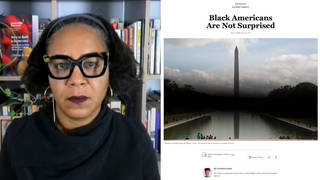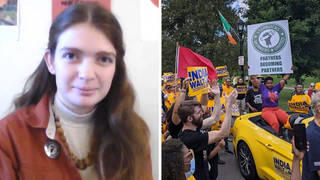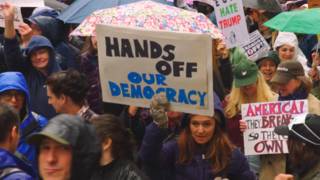
Guests
- John Nicholspolitical writer for The Nation. His new article is “An Election About GOP Extremism, Unions, Wages and Dollarocracy.” His latest book with Robert McChesney is Dollarocracy: How the Money and Media Election Complex Is Destroying America.
Links
- "An Election About GOP Extremism, Unions, Wages and Dollarocracy." By John Nichols (The Nation)
- “Dollarocracy: How the Money and Media Election Complex is Destroying America." By John Nichols and Robert McChesney (Nation Boo
- Follow John Nichols on Twitter: @NicholsUprising
- "Don’t Get Too Excited About Christie’s Politics of Style, Not Substance." By John Nichols (The Nation)
Election Day was held Tuesday, deciding state and local races across the country. In Virginia, former Democratic National Committee Chair Terry McAuliffe was elected governor, defeating tea party-backed Ken Cuccinelli, the state’s attorney general. McAulliffe’s victory was seen as a rebuke of the tea party-backed government shutdown that impacted many of the state’s workers. In New Jersey, Republican Gov. Chris Christie easily won re-election, paving the way for a possible presidential run in 2016. New Jersey voters also approved a constitutional amendment to raise the minimum wage by $1, to $8.25 an hour, and add automatic cost-of-living increases each year. Christie vetoed a similar bill last year. Backers of a measure to impose a $15-an-hour minimum wage at Seattle’s international airport and surrounding hotels have also declared victory. After campaigning on a vow to tackle inequality, Bill de Blasio won an overwhelming victory to become the first Democrat mayor of New York City in two decades. In another closely watched race, the union-backed Martin Walsh was elected mayor of Boston. “When I look across this country, I’m seeing results that say people are really ready to look at an alternative to austerity,” says John Nichols, political writer for The Nation. “They want something different than just 'cut, cut, cut.'” We also discuss the results of several other ballot measures, including victories for legalized marijuana in Maine and Colorado, and the defeat of a GMO-labeling proposal in Washington state.
Transcript
NERMEEN SHAIKH: In one of Tuesday’s most closely watched races, former Democratic National Committee Chair Terry McAuliffe has been elected governor of Virginia, beating tea party-backed Ken Cuccinelli, the state’s attorney general. Meanwhile, New Jersey Republican Governor Chris Christie easily won re-election, paving the way for a possible presidential run in 2016. New Jersey voters also approved a constitutional amendment to raise the minimum wage by a dollar to $8.25 an hour and add automatic cost-of-living increases each year. Christie had previously vetoed a similar bill. Here in New York, the city’s public advocate, Bill de Blasio, crushed Republican Joe Lhota in the mayoral race to replace Mike Bloomberg. De Blasio is set to become the first Democrat to lead New York in two decades. He held his victory party in Brooklyn last night.
MAYOR-ELECT BILL DE BLASIO: Now, I’ve spoken throughout this campaign about a tale of two cities. That inequality, that feeling of a few doing very well while so many slip further behind, that is the defining challenge of our times, because inequality in New York is not something that only threatens those who are struggling. The stakes are so high for every New Yorker. And making sure no son or daughter of New York falls behind defines the very promise of our city.
AMY GOODMAN: New York City Mayor-elect Bill de Blasio.
In another closely watched race, the union-backed Martin Walsh has been elected mayor of Boston.
There were also several ballot initiatives of note across the country. Voters in Washington state rejected an initiative that would have required foods containing genetically engineered ingredients to be labeled. The Grocery Manufacturers Association, Monsanto, DuPont, Dow and other opponents of GMO labeling spent over $20 million to defeat the measure.
To talk more about Tuesday’s election results, we’re joined by John Nichols, political writer for The Nation. His latest piece in The Nation is called “An Election About GOP Extremism, Unions, Wages and Dollarocracy.” His latest book, with Robert McChesney, is Dollarocracy: How the Money and Media Election Complex Is Destroying America.
Welcome back to Democracy Now!, John. So, let’s go through the big races—New York, New Jersey, Virginia.
JOHN NICHOLS: If you watch kind of national media in the—at the top line, what you’re going to hear is “Christie, Christie, Christie.” But the reality is, Chris Christie was the outlier yesterday. If you look across the country, it was a quite remarkable off-year election. Usually in the second term of a president, the other party does very, very well in these elections. It’s a way for people to kind of let off steam. And instead, the fact of the matter is Democrats won—it looks like they may have won every major office in Virginia. The attorney general’s race there is still very close. They definitely won governor. They definitely won lieutenant governor. It’s almost a tie on attorney general. But the last time that happened in the second term of a Democratic president, the Democratic president was Franklin Roosevelt.
AMY GOODMAN: But even with Chris Christie, just a quick comment. Let’s remember that the race for the Senate, Cory Booker—
JOHN NICHOLS: They put it off schedule.
AMY GOODMAN: —he could have had—right, he made it two weeks before, costing New Jersey $25 million. Chris Christie made it not on his day, because if Cory Booker were running on his day, first of all, his name would have been first, running for Senate, and more Democrats would have come out. It was never a question whether Chris Christie would win, but the news is the landslide he won by. And it sounds like he was very concerned about not winning by that landslide.
JOHN NICHOLS: Yes. It was—
AMY GOODMAN: So he spent $25 million to ensure this landslide.
JOHN NICHOLS: No, he didn’t spend it; the taxpayers did. But this is a false premise, on so many levels. Understand this, as well: Chris Christie forged relationships with South Jersey Democrats to kind of have people stand down. So the end result was he did everything he could to manufacture a headline. And as Bob McChesney and I write about a lot, our national media is like the—you know, it’s like the dog with the bone, you know, so you throw the headline out, and they go to it. But the fact is, two weeks ago in New Jersey, Chris Christie had a 33-point lead; turns out he wins by about 20 points. So, at the close of the race, when people started paying attention, the much-neglected Democratic candidate there, Barbara Buono, actually came up somewhat—not trying to paint a fantasy picture here, but at the same time Democrats kept control of the state Legislature, and—this, I think, is the big deal—the minimum wage increase that Chris Christie vetoed won by the same percentage of the vote that he won. New Jersey was style over substance. The substance of the New Jersey result is that people actually voted against what Chris Christie stands for in all the—all the other races. So, that’s—that’s your gubernatorial top-line stuff.
But I really would say that if we’re going to be honest about what happened yesterday, the great story, the remarkable story of it is that union-backed populists won big city races. And we haven’t had a lot of that in our history. We’ve got not just Bill de Blasio, who got a decent amount of attention, not as much as he deserves. I mean, he should be right up there in the—of the three top, it should be Virginia, New Jersey, New York. But then, also Marty Walsh up in Boston, that was a whomping big deal race. Marty Walsh kind of squeaked through the primary there. It was a very crowded primary. And he was attacked all over the place by people who said, “Oh, this guy’s a former union leader. He was the head of the building trades. He couldn’t possibly be a fair player as mayor of Boston.” You never hear that about a CEO, right? A CEO coming in: “Oh, yeah, they can run a city. They know how to run it like a business.” But because he came out of the unions, he was literally, in much of the media, attacked. They created a video up there that showed him at a rally protesting Scott Walker’s policies in Wisconsin, and said, “Do you want this kind of person as your mayor?” Well, Boston decided they did want that kind of person as their mayor. It was a big deal victory. And you combine that with some of the minimum wage increases, the SeaTac win for the $15 minimum wage in Seattle, I think that’s a sub-story that’s really important.
NERMEEN SHAIKH: But you’ve also suggested that some of these Democratic wins might suggest that Republicans are no longer contenders at all in urban America. Could you explain?
JOHN NICHOLS: I think this is a really fascinating thing. You know, I’m a historian, to some extent, of the moderate Republican and liberal Republican tradition, which I think is a very valid part of American history. And not that long ago, if we had an election night like this, an off-year election, we’d be talking about urban Republicans winning—you know, a Mike Bloomberg, a Rudy Giuliani, going back, a John Lindsay, a Arlen Specter, who came out of the Philadelphia Republican—
AMY GOODMAN: De Blasio, Democrat won for the first time in 20 years.
JOHN NICHOLS: Yeah. And really, when we go back, when you look back at it, Republicans did very, very well in urban races. Now, look at this. L.A., which used to have a Republican mayor, has a relatively liberal Democratic mayor. New York has a Democratic mayor. In fact, the top—I think you have to go down to like the 12th or 13th largest city to find a Republican. The Republicans have abandoned big cities. They—you know, look at—here’s a party that’s cutting food stamps, that’s cutting shared revenues, that’s cutting services. And their message is, “We’re just not interested in these people anymore.” And I think it’s started to really come back on Republicans at the urban level. Joe Lhota in New York tried desperately—literally said—
AMY GOODMAN: The Republican candidate.
JOHN NICHOLS: Yes, he literally said in debates, “I’m not a national Republican. I’m not one of these guys.” But it didn’t—it didn’t take.
AMY GOODMAN: But he also went to Staten Island to court the tea party.
JOHN NICHOLS: I’m not—I’m not trying to make the case for the guy, but what I’m telling you is that I think the Republican Party’s abandonment of urban America has really come back to haunt it electorally, and we saw that really played out last night.
AMY GOODMAN: Bill de Blasio kept talking about bringing back a progressive agenda. Let’s go back to his speech, his victory speech, last night.
MAYOR-ELECT BILL DE BLASIO: The best and the brightest are born in every neighborhood. We all have a shared responsibility and a shared stake in making sure their destiny is defined by how hard they work and how big they dream, and not by their zip code. So, when we call on the wealthiest among us to pay just a little bit more in taxes to fund universal pre-K and after-school programs, we aren’t threatening anyone’s success. We are asking those who have done very well to ensure that every child has the same opportunity to do just as well as they have. That’s how we all rise together.
AMY GOODMAN: Taxing the rich.
JOHN NICHOLS: Yeah.
AMY GOODMAN: This is Bill de Blasio. He kept repeating it. He also spoke at Occupy in 2000.
JOHN NICHOLS: Yeah, and so did—and the new public advocate, Tish James, actually joined a suit as regards the handling of Occupy, on the side of the demonstrators. I mean, New York had a—it’s pretty close to an Occupy victory here, at least something that had respect for it. And the thing about Bill de Blasio last night was he held that victory party not in Manhattan, but in Brooklyn. That’s a message about the whole of this city, not just those zip codes with the higher incomes. And he also, in the midst of the speech—I thought one of the most remarkable things I’ve seen—he went straight into Spanish. And I’ll admit, maybe his Spanish isn’t perfect, but, boy, I found that—I cover a lot of politics. I found—
AMY GOODMAN: And it wasn’t just a line.
JOHN NICHOLS: No, he went on and on. And I found it one of those—one of those rare moments in politics where it wasn’t what you said as much as what you did, and I think it had a profound impact. But that taxing the rich thing, let me tell you, that is—that—national Democrats, who are like usually the slowest people in the world to catch up with anything, really ought to pay a little attention to this. Bill de Blasio was attacked yesterday—or two days ago, the New York Post headline had a hammer and sickle on it. They were basically saying, “Yo, this guy’s Moscow’s candidate.” Did everything they could do to attack the guy, and yet people saw through that, and they recognized that what he was talking about was a necessary way to deal with an austerity moment.
And the other thing is, if you look out in Seattle, Kshama Sawant, who ran out there, she was an open socialist running, saying $15 minimum wage, millionaire tax, no austerity cuts. She got 46 percent of the citywide vote for City Council. So, what I’m telling you is that when I look across this country, I’m seeing results that say that people are really ready to look at an alternative to austerity. They want something different than just cut, cut, cut. And there is an alternative. It is a fair tax policy, and that’s what de Blasio talked about.
NERMEEN SHAIKH: But could you talk about the role of money in the elections? Even if all of these Democrats won, I mean, Chris Christie, obviously, Republican, had a six-to-one advantage compared to his rival, and Bill de Blasio also raised far more money than Joe Lhota did. So, could you explain—
JOHN NICHOLS: Absolutely.
NERMEEN SHAIKH: —in that, as well as in the GMO labeling and other—
JOHN NICHOLS: Yeah, that’s the ugly part of it. I mean, when we talk about politics, we have to operate on many, many different levels and see many, many different aspects of it. So you can look across this country and say that people desperately are trying to send signals to their politicians, even against the money power. But the money power was very, very much in play. Dollarocracy was on the march yesterday. The two gubernatorial candidates who won—McAuliffe in Virginia and Christie in New Jersey—were both candidates that the business communities in their state were very, very supportive of them. Both of them had real financial advantages.
And as you go across the country, you’re going to see that—two realities. Number one, usually the person with the most money won—and often a lot more money. That money often came from outside the community where the race was going on. Also, the most important thing is that even in the city level, we’re starting to see these independent expenditures. We’re starting to see money flowing from all sorts of different sources, not always well tracked. So, that’s reality.
But you were so smart to focus in on that GMO labeling thing in Washington state. That is the ugliest manifestation of dollarocracy, because here you have a Western state that produces a lot of food, and also, frankly, that has a—I think it’s fair to say, in Washington state around Seattle and other communities—a sensibility that, you know, wants to have good, healthy, safe food. Now, I’m not even getting in the GM debate, but my point is that people want—you know, generally, polling, if you just ask people casually, yeah, they’d like to know, they’d like a label. And yet, $22 million in outside money came in. And this was a transactional investment. You saw the largest food manufacturers in America literally coughing up $2 million, $3 million chunks of money into this pool to defeat a simple label on your food products. And the—there was one study that suggested that of that $22 million, under $1,000 came from inside Washington. And it was just outside money pouring in to warp the democracy of a state.
AMY GOODMAN: We’re going to break. When we come back, I want to ask you about the marijuana initiatives, also the fracking initiatives. We’re talking to John Nichols of The Nation. This is Democracy Now! We’ll be back in a minute.
[break]
AMY GOODMAN: This is Democracy Now!, democracynow.org, The War and Peace Report. I’m Amy Goodman, with Nermeen Shaikh, as we turn right now to the initiatives. There were several key votes related to the regulation of marijuana. In Maine, residents of Portland approved a measure that would legalize small amounts of marijuana possession. Voters in Colorado approved a measure to tax recreational marijuana, apply the first $40 million in revenue generated by the tax to school funding. Residents in Denver, Boulder and Littleton, Colorado, also passed municipal referenda to impose additional sales taxes on marijuana at the city level. And here in New York, Kenneth Thompson beat longtime Brooklyn DA Charles Hynes in a landslide election. Thompson has promised to move to decriminalize possession of marijuana by refusing to bring criminal cases against people arrested with small amounts of the drug. John Nichols of The Nation and author of Dollarocracy, the significance of these pot measures across the country?
JOHN NICHOLS: Well, it’s—I think it’s one of the wonderful things about democracy. When you actually give people a chance to vote on some of the issues which we’re told so often in our media are still controversial and divisive, they’re not. The fact of the matter is that in Portland, Maine—and I was up there, I actually talked to folks who were doing this thing—they didn’t have a lot of money. They didn’t have some sort of big, you know, multimillion-dollar campaign. These were grassroots folks who, you know, had tried to do a statewide law and had not gotten all the progress they had wanted statewide, so they put this thing on the ballot in Portland. They won 67 percent of the vote. I mean, it was a landslide. And the fact of the matter is that in places across this country, when you say to voters, “Look, we want to either decriminalize or legalize marijuana,” the response of voters is, “Yeah, it’s time.” It’s much like the marriage equality issue. It took the political class and the media class a long time to catch up with the reality that the arc of history had in fact bent toward justice.
On marijuana, you have a remarkable combination of factors. One is a lot of people who just don’t think it’s as scary a thing as they’ve been told. But the other thing is—and I think this is especially true in Ken Thompson’s victory, Kenneth Thompson’s victory in Brooklyn—he associated it with issues like stop-and-frisk and a lot of other concerns, that young people who were busted with a small amount of marijuana ended up being, you know, thrown into a legal system, and, in fact, there weren’t that many full prosecutions, but it’s just the idea that you were getting hit by that. And so, what he said is, “Look, let’s—we’re just not going to prosecute these.” That is a signal to the police. It’s a signal to the whole structure, that “Let’s stand down in this area. Let’s stop using this, perhaps, as an excuse to hassle folks. And let’s look at real crimes, at more serious crimes.” I think that combination of factors—one, people who actually think this isn’t as big a deal, and two, folks who think that this has really become a part of policing that we ought to be concerned about and ought to address—has created some very significant patterns of results across the country.
NERMEEN SHAIKH: So, what do you think, John—how does this relate, the results—what do they reflect about changes in the national conversation politically on some of these crucial issues?
JOHN NICHOLS: Well, I hope that the fracking referendums from Colorado will kind of feed up the political food chain. I’m not sure it will. The fact of the matter is—
AMY GOODMAN: And talk about those.
JOHN NICHOLS: Well, you know, we all know what fracking is. It’s where you’re, you know, kind of beating up the ground in order to kind of soften it up to get fuel resources out of it. And what you had in Colorado was some citizen referenda—some referendums on the ballot where people were given right to say, “Look, we don’t want this here. We”—
AMY GOODMAN: At least three of four banned fracking.
JOHN NICHOLS: Yes, yeah. And these are—
AMY GOODMAN: And then in Ohio, one of three banned fracking.
JOHN NICHOLS: Yeah, and at the grassroots across this country, this is a huge movement. I mean, there are people all over this country, and this is—I want to emphasize—conservatives, liberals, Democrats, Republicans. When you got this in your neighborhood, you’re concerned, and you want to address it. And when people are given a right to vote on this, to weigh in, there’s a lot of evidence that they really object.
That’s the kind of thing that ought to, again, feed up the political food chain. It ought to go to the legislatures. It ought to go to Congress. President Obama and others ought to hear this and recognize that as they advance energy policies, this notion that fracking should be a big part of our future energy policy in this country ought to be rethought. The people are saying that from the grassroots. There are so many things that the people try to say and try to get through this—this money-and-media-election complex that is so hard to break through. And I think that today or yesterday what you saw was, people are trying to say, “We really want some different policies on the drug war We would really like some different environmental and energy policies.” That’s coming up there. They clearly—I think there’s no question they said, “We want a different approach to austerity. Instead of cuts, we’d like to do different tax policies and actually look at, you know, raising the wage floor, things of that nature.”
And my concern always is that so much of our media doesn’t—doesn’t carry those messages up, and in fact we sort of put a wall on these local referendums. And that’s why I’m so glad we’re talking today, because this is what we ought to do. We ought to look at elections as individual local events across this country, be we should also look for those patterns, those messages that come out. And I frankly think that Tuesday’s elections sent quite a few important messages.
AMY GOODMAN: Well, John Nichols, we want to thank you very much for being with us. John Nichols is a political writer for The Nation. His new article is “An Election About GOP Extremism, Unions, Wages and Dollarocracy.” And before we go, one last question about Alabama.
JOHN NICHOLS: Yes, a huge battle in Alabama in a Republican primary between the Chamber of Commerce and the tea party. This is a play-out of the shutdown. And it looks like the money power won. The Chamber of Commerce moved a lot of money into a district to try and nominate a guy who was a slightly more moderate conservative over a guy who was a very, very extreme right-wing candidate. And so, you saw money prevail down there. It looks like a money advantage. But we should also be conscious of the fact that this is really the beginning of a huge fight for 2014 for the soul of the Republican Party.
AMY GOODMAN: Well, thanks, John. Also, congratulations on the 10th anniversary of Free Press.
JOHN NICHOLS: Thank you so much.
AMY GOODMAN: John Nichols, his book is called Dollarocracy. He wrote it with Bob McChesney, How the Money and Media Election Complex Is Destroying America. This is Democracy Now!, democracynow.org, The War and Peace Report.












Media Options